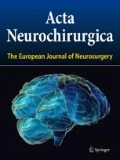Summary
¶Background. After open surgery for ruptured ACoA aneurysms, several patients who have achieved a favourable neurological outcome still exhibit significant cognitive deficits. The aim of this study was to investigate the cognitive performances in patients with ACoA aneurysms submitted to different therapeutic options such as endovascular treatment and surgical clipping.
Methods. We evaluated 37 consecutive patients in WFNS grade I or II, who underwent an early treatment (within 48 hours) of a bleeding ACoA aneurysm: 20 out of 37 were surgically clipped (group A) and 17 were treated with endovascular coiling (group B).
These two groups were compared with 16 patients (group C) with subarachnoid haemorrhage and negative cerebral panangiography and with 18 volunteers (group D) without neurological or psychiatric disorders.
All patients were neurologically intact at discharge and were in Glasgow Outcome Scale 1 at 6 months follow-up after SAH.
All subjects were tested to assess selective attention, verbal, spatial and logical memory, frontal lobe executive functions, language and intelligence. Depressive symptoms and anxiety were also examined.
Findings. Selective attention, verbal and spatial memory, and intelligence tests didn’t show any significant difference between the patients and the controls.
Surgically treated patients showed a significant worse performance on the logical memory and on the frontal lobe executive functions compared to controls, while the endovascular group and the group C (not treated) showed a significant decrease only in the literal fluency score.
Moreover, the surgical group showed a significant impairment in using grammatical and syntactical rules to produce sentences. No significant difference was found between the group B, C and controls. Treated patients were not significantly more depressive or anxious than controls.
Interpretation. Investigation of neuropsychological deficits can show an impairment, even in patients classified as good outcome by Glasgow Outcome Scale (GOS).
The frontal lobe functions and language are impaired especially in surgically treated in comparison with controls, but no significant difference was found respect to the endovascular and no treated patients (group C).
Similar content being viewed by others
Author information
Authors and Affiliations
Additional information
Published online September 18, 2003
Rights and permissions
About this article
Cite this article
Fontanella, M., Perozzo, P., Ursone, R. et al. Neuropsychological assessment after microsurgical clipping or endovascular treatment for anterior communicating artery aneurysm. Acta Neurochir 145, 867–872 (2003). https://doi.org/10.1007/s00701-003-0111-5
Issue Date:
DOI: https://doi.org/10.1007/s00701-003-0111-5




